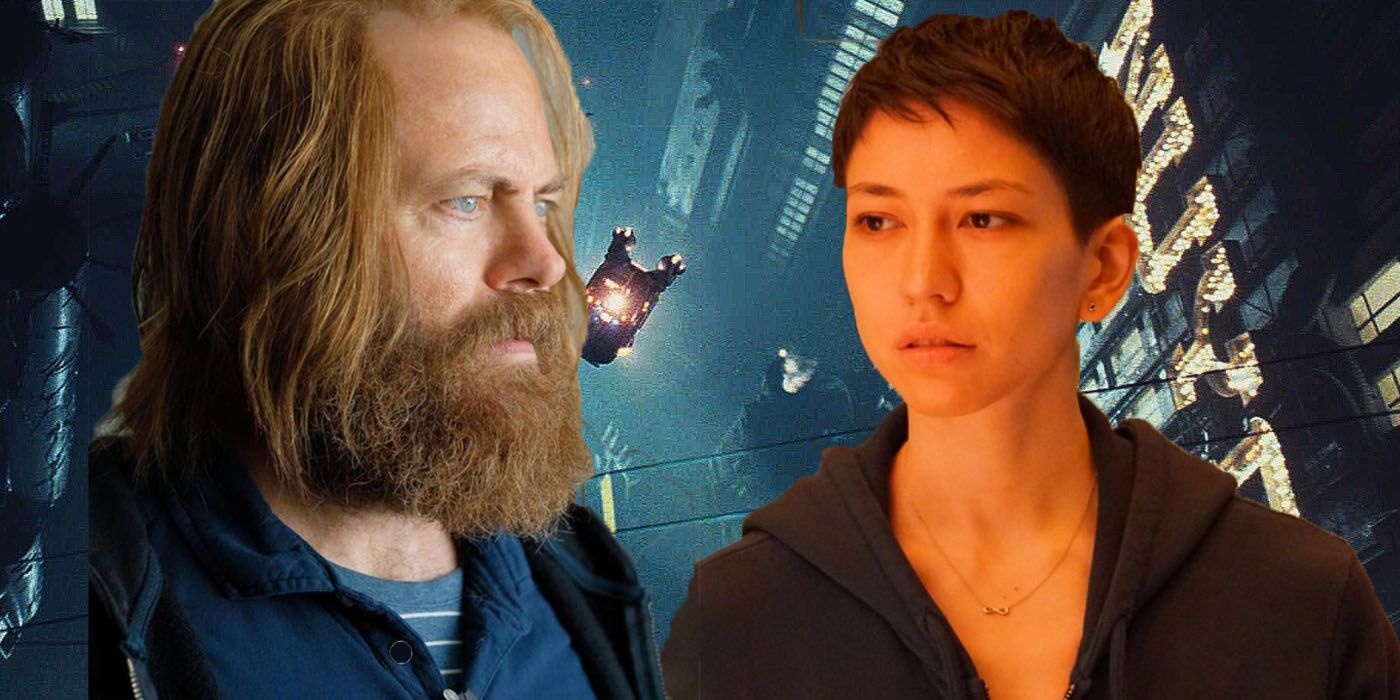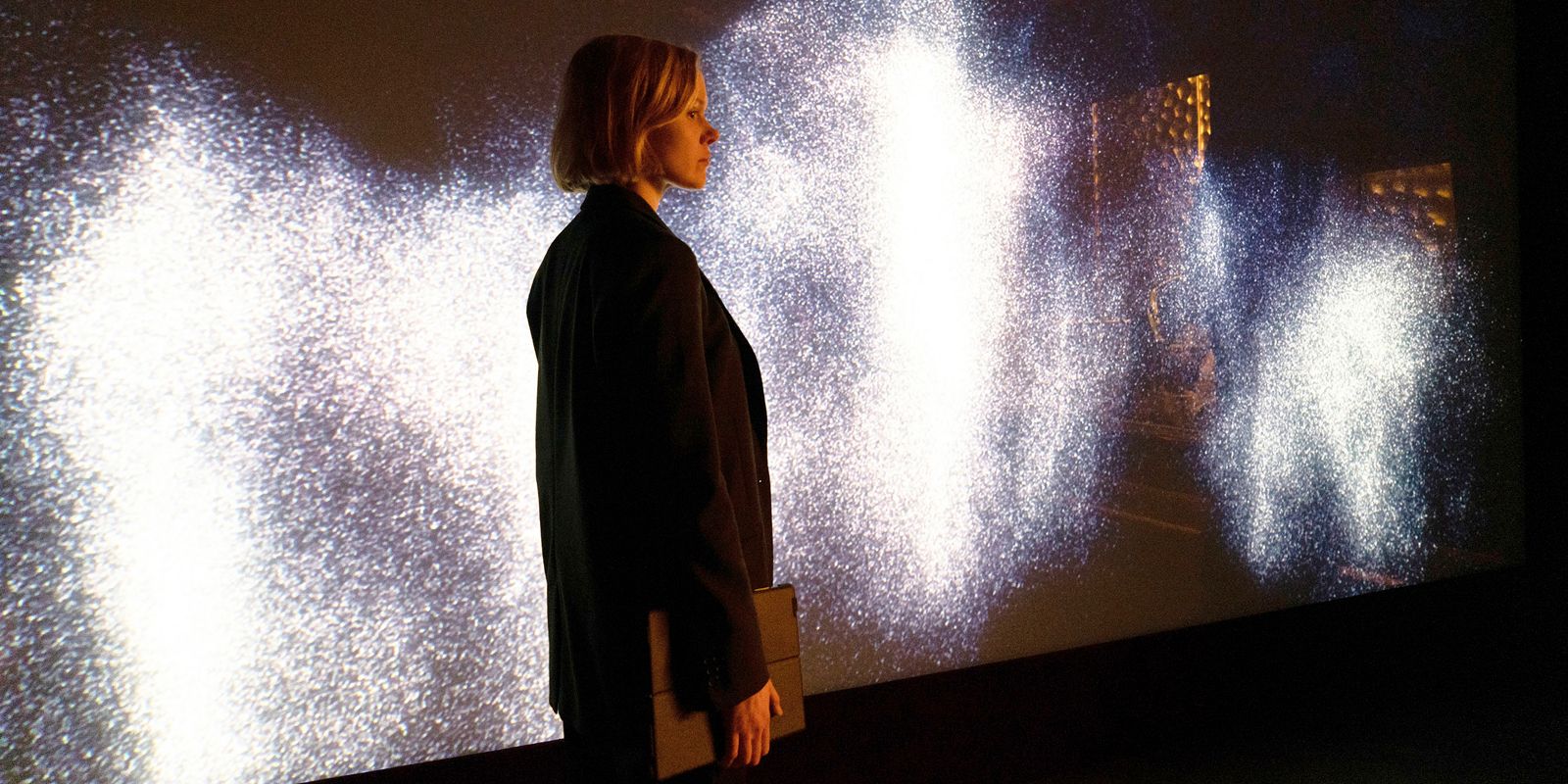
Hulu's Devs only has one more episode to go before it finishes its eight-episode run, but it has already cemented itself as the herald of a new era of cyberpunk - one that subverts a lot of the tenets of the genre. The cyberpunk genre has its roots as far back as the late 1960s and early 1970s, owing to the works of Philip K. Dick and J. G. Ballard, as well as comic book properties such as 2000 AD's popular Judge Dredd strip. While the themes and concepts that would become prominent pillars for the genre were spread out and not yet distilled into one creative trademark, that would change in 1984 with the release of William Gibson's hugely influential novel Neuromancer. Neuromancer's slick combination of punk rock sensibilities and the hacker ethos began to define cyberpunk as its own genre, and other popular works such as the manga Akira and the iconic film Blade Runner, would bring the subgenre to the forefront of popular culture.
Alex Garland, the science-fiction filmmaker who wrote and directed Devs, borrows inspiration from many different sub-classifications of sci-fi. His debut feature Ex Machina was an existentialist techno-thriller concerned with the question of human nature, while his follow-up film, Annihilation, was a pseudo-adaptation of Jeff Vandermeer's bio-horror novel. Devs seemingly veers away from the subject matter that he's touched on before, following a young computer engineer, Lily (Sonoya Mizuno), who becomes engrossed in the mysterious death of her boyfriend Sergei (Karl Glusman), and the potential involvement of the tech company that they both worked for, Amaya. As the show unfolds, audiences quickly realize that Amaya is working with forces fundamental to the laws of physics and could very well challenge the very nature of reality.
Devs certainly has a lot in common with the cyberpunk genre; however, there are basic differences that make it feel like an evolution. While the cyberpunk genre has resurfaced in new ways with recent entries such as Blade Runner 2049, Devs represents an interesting development in the nature of the subgenre.

A massive part of the early entries into the cyberpunk subgenre is the setting - the atmosphere of the stories' societies. The Judge Dredd comic strip presents readers with a heavily militarized police state that resembles New York City's urban sprawl, while Akira takes place in Neo-Tokyo, a vision of the Japanese capital overrun by gang violence, social turmoil, and political and militaristic upheaval. Both Blade Runner and Neuromancer highlight the United States as a seedy corporatized nation, suffering from overpopulation and the allure of rampant consumerism. All of these properties use their setting as a window into the future, one that shows us where contemporary societies are heading if their vices spiral out of control.
Devs does the exact opposite of this. While other works in the cyberpunk subgenre opt for an overtly dystopian vision of the future, Devs roots itself firmly in the here and now. Everything about the show presents itself as unassumingly contemporary, from the costume design to the set design and everything in between. In fact, aside from the highly advanced quantum computer built by the Devs team to project the past and predict the future, nothing about the show is inherently futuristic.
This adds a new and slightly sinister layer to the events happening in the show. If other stories defined as cyberpunk seem to be offering a glimpse of where societies might be heading if they don't reconsider their actions, Devs has no such scapegoat. Just like the determinist philosophy offered by Amaya's CEO, Forest (Nick Offerman), the show's dystopia is already here, obscured from view and heralded by the geniuses who've decided to play God.

Another defining element of cyberpunk is the flashy and heightened sense of stimulation present in the medium. In Blade Runner, Akira, and Neuromancer, the settings are characterized by an overabundance of neon and technological screens, marketing whatever new advancements in materialism have come about at the time. These works of art make great use of these visuals as a commentary on an over-stimulated culture that allows for rampant corporatism to rise in a time of extreme social turmoil.
Devs rejects this look, choosing instead to depict reality in an equally eerie veneer of banality. Everything aside from the Devs headquarters is frustratingly ordinary, which contrasts the absolutely earth-shattering nature of the Devs project. Just as Katie tells Sergei in the first episode that the Devs project "changes nothing," the show's aesthetic latches onto a drained depiction of the real world. While the quantum computer may be able to predict the future, it can't change the world from what it already is.

The fear of technological advancement is something that has worked its way into the core of the cyberpunk subgenre. Arguably its most famous film entry, Blade Runner, has a distrust of machines at the core of its message, and while the movie certainly advocates for the humanity of the replicants that Deckard is hunting down, it also frequently reminds us at every turn that society condemns replicants simply for being what they are. On the contrast, a work like Neuromancer chooses instead to revel in the advancement of technology, with the main character Henry Case viewing the Matrix as a digital escape from the suffering of the real world.
Devs takes both of these viewpoints and reckons with them in a nuanced and powerful way. While technology isn't outright demonized here like it is in some other science-fiction properties, it is treated apprehensively, with a level of distrust for those using it for their own gain. Forest seeks to exploit the quantum computer for his own selfish reasons, and this echoes throughout the way Forest interacts with his employees and vice versa. More than questioning the technology itself, Devs chooses to question those behind it, a powerful commentary in an era filled with controversial tech giants like Mark Zuckerberg and Elon Musk. As it nears closer to its endgame, Hulu's Devs has truly exemplified the best of what the cyberpunk genre has to offer.
from ScreenRant - Feed https://ift.tt/3cbDc9Q





No comments: